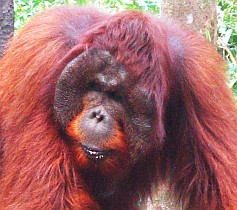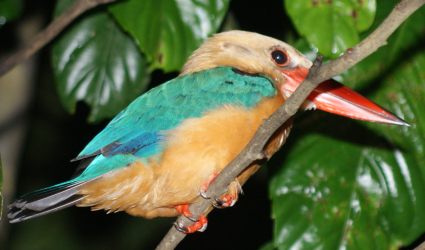
Male orangutan, Indonesia
|
Flora & Fauna Areas SE Asia Flora/Fauna Related Pages Southeast Asia HomeSoutheast Asia Letters |
Southeast Asia Flora/Fauna
Some of the animals and plants (the flora and fauna) of Southeast Asia -- Indonesia (including Kalimantan, Borneo) the Malaysian Peninsula and Malaysian Borneo, plus Thailand.
| Want to travel to SE Asia?
For Indonesia, the main gateways are the international airports in Bali (closest to Komodo National Park) or Jakarta. From Jakarta you can get internal flights to Kalimantan to get to Tanjung Puting NP and the orangutan sanctuaries. The Malay Peninsula and the Borneo states of Sabah and Sarawak are best accessed through Singapore or Kuala Lumpur. For the island of Langkawi, Malaysia, you can fly to either Kuala Lumpur or Bangkok, Thailand, and get connecting flights or travel by excellent bus and ferry. The gateway to Thailand's national parks is Bangkok or overland from Malaysia. |
 Male orangutan, Indonesia |
The natural vegetation and habitats of the parts of Southeast Asia that we sailed through (or visited overland) are incredibly varied, ranging from the semi-arid scrub of East Nusa Tenggara, Indonesia, to the riverine forests of southern Borneo, (Kalimantan, Indonesia), the rainforests of Peninsular Malaysia, and the arid hills of Thailand. Animals as varied as the huge Komodo Dragon, the Indo-Chinese Tiger, Orangutans, colorful parrots and the White Bellied Sea Eagle occupy ecological niches in the region. This section highlights some of the main animals and plants of those parts of Southeast Asia that we visited - Indonesia, Malaysia and Thailand. We've also published pages on the plants, primates (apes and monkeys), birds, and other animals such as the reptiles, tigers and elephants of Malaysia and Thailand.
An invaluable guide to understanding the ecology of the tropical world is
A Naturalist's Guide to the Tropics
by Marco Lambertini.
|
One of many Strelitzia species, Malaysia |
Indonesia stretches over 5,000 km (3,000 miles) and has the richest diversity of flora and fauna in all of Asia. From the mountainous interior of Papua to the rain forests of Sumatra, Java and Kalimantan (Borneo). From the coral reefs of the Banda Sea (and the largest coastal surface area of any tropical country) to the semi-arid regions of the south east. The only two countries on earth with more forested land are Brazil and the DRC (Congo). Indonesia is rated one of only 6 countries in the world with “mega‑diversity”. It ranks first in the world for swallowtail butterflies, second for mammal species (515, with 40% endemic), fourth for reptiles (511 species) and fifth for birds (1,531 species with 400 endemics.) Indonesia has 33 monkey species (half of which are endemic), ranking it higher than any other Asian country.
That being said, travel in Indonesia is difficult off the beaten track, and we were blessed to be able to see so much by sailboat. It is such a vast area that to appreciate all of its wondrous flora and fauna would take ten lifetimes!
 Stork-billed Kingfisher, seen in Borneo |
The island of Borneo is the world's third largest island (after Greenland and Papua New Guinea). The southern two-thirds belong to Indonesia (that area being named Kalimantan) and the northern third belongs to Malaysia (the states of Sarawak and Sabah). We traveled only to one small part of Kalimantan, the southwest corner where Tanjung Puting National Park is home to protected wild orangutans. But we did travel extensively in Malaysian Borneo -- many miles up both the Kinabatangan and Klias Rivers, to the slopes of Mt. Kinabalu (the region's highest mountain, 13,500' or 4100 meters), and deep into the lowland forests of Sarawak. We also hiked in the pristine rainforest of Taman Negara, one of the world's oldest rainforests, claiming to be over 130 million years old, on Peninsular Malaysia. With all of these adventures we learned, bit by bit, more about the flora and fauna of this incredibly rich and diverse part of the world.
Top Level: Home | Destinations | Cruising Info | Underwater | Boat Guests | Ocelot | Sue | Jon | Amanda | Chris | Site Map | Make a Comment
|
If our information is useful, you can help by making a donation |
Copyright © 2000‑ Contact: Jon and Sue Hacking -- HackingFamily.com, svOcelot.com. All rights reserved.